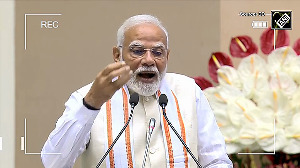Once hailed, now failed: Formula One's KERS kinetic energy recovery system appears to be surging towards the scrapheap at the end of the season.
Offering drivers a brief boost of power at the push of a button, KERS was introduced this year as greener technology that would help Formula One to move away from its gas-guzzling image, contribute to road car development and liven up the sport with more overtaking.
It has not worked out that way, even if there have been a few highlights such as world champion Lewis Hamilton's ultimately unsuccessful KERS-propelled surge into the first corner at the Nuerburgring last weekend.
Ferrari boss Stefano Domenicali said on Sunday that the champions had frozen development of a system that stores energy generated by the car's brakes and makes it available as a burst of extra power for overtaking or to stave off a rival.
It has been used by only four of the 10 teams since the Australian season-opener in March.
None of the four -- Ferrari, McLaren, BMW-Sauber and Renault -- have won a race with it and only Ferrari have stepped on to the podium. All have spent millions of dollars on development.
The Formula One Teams Association (FOTA), whose eight members include all the manufacturer-owned teams, have agreed to jettison the system for 2010 even if it remains in the regulations as an option at present.
"We have discussed the KERS issue within FOTA and we had a majority agreement not to use KERS next year," said BMW-Sauber team boss Mario Theissen, one of the system's biggest backers when it was introduced.
"We had supported KERS but we have committed to the agreement...so we will not run KERS and there was no FOTA member voting for KERS," he said.
BMW finished third in last year's constructors' championship with 135 points but have scored just eight this season. Between them, the four KERS teams have fewer points than Brawn's championship leader Jenson Button after nine races.
BIG STORY
At last month's British Grand Prix, Ferrari were the only team to use KERS.
Theissen hesitated to call it a failure, however.
"I still think that KERS would have been very good, not just for BMW as a manufacturer but also for Formula One as a whole because it is a very credible piece of innovation relevant to future road cars which Formula One has pioneered and really pushed forward," he said.
"We are using it, we have transferred it into road car projects already," he added. "All the guys who have done the Formula One system are working on road car projects now. So this really could have been a big story for Formula One."
The problem, he said, was that the governing International Automobile Federation (FIA) agreed to make use of the system voluntary.
While that helped teams such as championship leaders Brawn GP, who were left without a KERS system when Honda withdrew, it has worked against those carmakers who spent heavily on the technology and believed it would ultimately give them an advantage.
Toyota and Williams were among those to develop systems that have yet to be raced.
"In terms of competitiveness it is no coincidence probably that all the four top teams of the past three years have gone backwards collectively," said Theissen.
"It's been these four teams that have come up with KERS and what we have learned is that if you want to pioneer an innovation, you have to fully back it. If you do it optionally, it won't work, it won't fly. You have to make it mandatory."
MCLAREN SUCCESS
Mercedes have been credited with the most efficient and reliable KERS system but their car has struggled for pace.
"If we didn't have KERS, then the overall packaging of the car would change and there would be some pluses from that but overall we have a good benefit," said McLaren boss Martin Whitmarsh.
"It is our intention at the moment to continue running KERS for the rest of the year.
"The alternative strategy is to redesign the whole car without KERS and that takes a lot of resource and frankly would detract from next year's programme."
Mercedes motorsport head Norbert Haug said KERS gave Hamilton three-and-a-half tenths of a second per lap at the Nuerburgring last weekend but Whitmarsh recognised the advantage had to go.
"KERS is still in the regulations for next year but we have accepted that part of the new era of Formula One has got to be cooperation among the teams; you've got to sometimes forego your short-term self interest in the interests of the sport," the Briton told reporters.
"We've accepted that the majority of teams in Formula One do not want to have KERS and therefore we are willing to sacrifice the advantage that we have at the moment."
Williams, a team who keep a very close eye on costs, have been developing their own flywheel version of KERS but have yet to race it. Team boss Frank Williams said all was not lost, however.
"It has very useful and truly interesting commercial applications. It's got its own life in that direction," he said.







